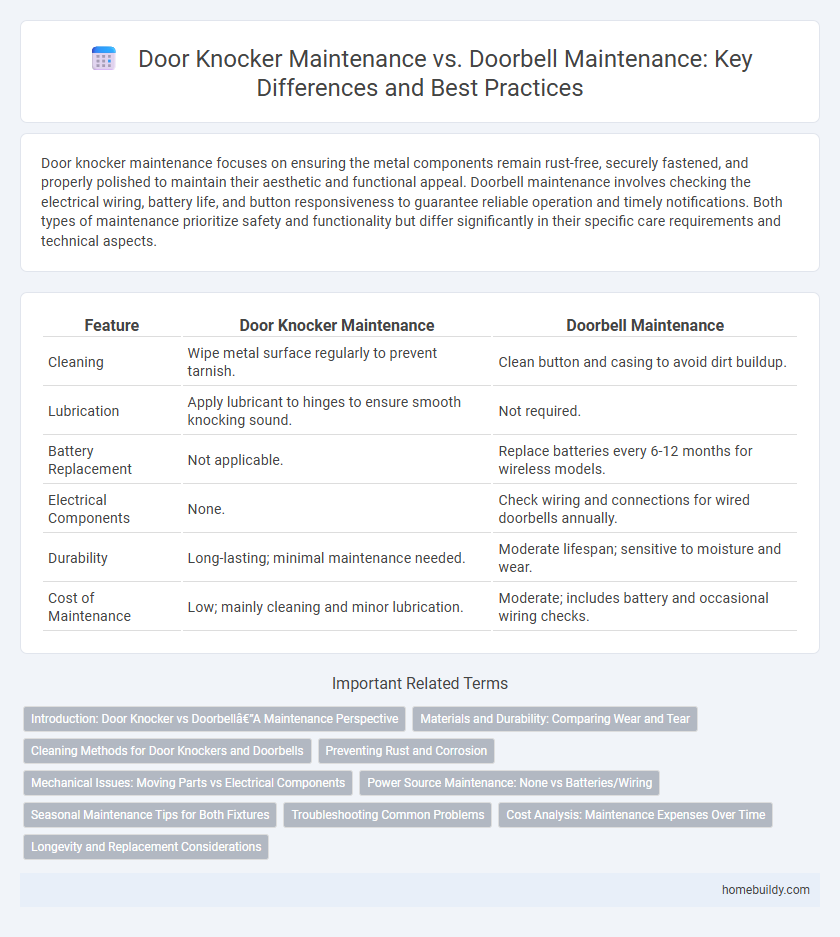Door knocker maintenance focuses on ensuring the metal components remain rust-free, securely fastened, and properly polished to maintain their aesthetic and functional appeal. Doorbell maintenance involves checking the electrical wiring, battery life, and button responsiveness to guarantee reliable operation and timely notifications. Both types of maintenance prioritize safety and functionality but differ significantly in their specific care requirements and technical aspects.
Table of Comparison
| Feature | Door Knocker Maintenance | Doorbell Maintenance |
|---|---|---|
| Cleaning | Wipe metal surface regularly to prevent tarnish. | Clean button and casing to avoid dirt buildup. |
| Lubrication | Apply lubricant to hinges to ensure smooth knocking sound. | Not required. |
| Battery Replacement | Not applicable. | Replace batteries every 6-12 months for wireless models. |
| Electrical Components | None. | Check wiring and connections for wired doorbells annually. |
| Durability | Long-lasting; minimal maintenance needed. | Moderate lifespan; sensitive to moisture and wear. |
| Cost of Maintenance | Low; mainly cleaning and minor lubrication. | Moderate; includes battery and occasional wiring checks. |
Introduction: Door Knocker vs Doorbell—A Maintenance Perspective
Door knocker maintenance primarily involves regular cleaning and occasional rust prevention to preserve its metal finish and mechanical function. In contrast, doorbell maintenance often requires battery replacements, electrical checks, and troubleshooting wiring issues to ensure consistent operation. Understanding these differences highlights the simpler upkeep of door knockers compared to the more technical care needed for doorbells.
Materials and Durability: Comparing Wear and Tear
Door knocker maintenance often involves preserving durable materials like brass, iron, or bronze, which resist corrosion and mechanical wear over time better than many doorbell components. Doorbells, especially electronic ones, require upkeep of wiring and button mechanisms prone to damage from moisture and frequent use. The solid metal construction of door knockers typically results in lower wear and tear, making them more resilient in harsh weather compared to doorbells that rely on electrical parts vulnerable to environmental stress.
Cleaning Methods for Door Knockers and Doorbells
Door knocker maintenance primarily involves gentle cleaning with mild soap and water to preserve metal finishes and prevent tarnish, while doorbell maintenance focuses on keeping electronic components dry and dust-free using soft, dry cloths and occasional compressed air. Avoiding abrasive materials and harsh chemicals is essential for both to maintain functionality and appearance. Regular inspection of door knockers for rust and doorbells for corrosion or loose connections improves longevity and performance.
Preventing Rust and Corrosion
Door knocker maintenance primarily involves regular cleaning and applying protective coatings to prevent rust and corrosion, especially on metal surfaces like brass and iron. Unlike electronic doorbells, door knockers require manual upkeep to withstand weather exposure, such as using rust-resistant paint or sealants. Proper maintenance extends the longevity of door knockers by preserving their aesthetic appeal and functionality against moisture and oxidation.
Mechanical Issues: Moving Parts vs Electrical Components
Door knocker maintenance primarily addresses mechanical issues involving moving parts such as hinges and screws, which require regular lubrication and tightening to prevent wear and ensure smooth operation. Doorbell maintenance focuses on electrical components like wiring, switches, and batteries, necessitating periodic checks for corrosion, connectivity, and power supply issues. Understanding these differences is crucial for effective upkeep, as door knockers demand physical care of mechanical systems while doorbells require attention to electrical functionality.
Power Source Maintenance: None vs Batteries/Wiring
Door knocker maintenance requires minimal effort due to its purely mechanical design, eliminating the need for power source upkeep. In contrast, doorbell maintenance often demands regular battery replacements or electrical wiring checks to ensure consistent functionality. The absence of power source dependency makes door knockers more reliable and cost-effective over time.
Seasonal Maintenance Tips for Both Fixtures
Regular seasonal maintenance of door knockers involves cleaning metal surfaces with appropriate polishes to prevent tarnishing and lubricating moving parts to ensure smooth operation. Doorbell maintenance requires checking electrical connections, replacing batteries if wireless, and inspecting the button for wear or corrosion. Both fixtures benefit from weatherproofing treatments and prompt repairs to maintain functionality and aesthetic appeal throughout changing seasons.
Troubleshooting Common Problems
Door knocker maintenance primarily involves checking for loose screws, rust, and ensuring the metal components swing freely to avoid squeaking or sticking. Doorbell maintenance requires troubleshooting electrical issues such as dead batteries, loose wiring, or faulty chimes that prevent proper sound functioning. Regular inspections of both devices improve longevity, but doorbells often need more frequent attention due to their reliance on electrical components.
Cost Analysis: Maintenance Expenses Over Time
Door knocker maintenance typically incurs lower costs over time due to its simple mechanical design requiring occasional cleaning and tightening, whereas doorbell maintenance often involves higher expenses linked to electrical components and battery replacements. Repair costs for doorbells fluctuate based on model complexity, including wired versus wireless systems, while door knockers demand minimal upkeep with durable materials like brass or iron. Evaluating long-term maintenance expenses reveals that door knockers offer a more cost-effective solution compared to doorbells, especially in environments with limited access to electrical upkeep.
Longevity and Replacement Considerations
Door knocker maintenance involves regular cleaning and tightening to prevent rust and ensure durability, typically lasting decades with minimal repairs. Doorbell maintenance often requires battery replacements and electronic component checks, which may lead to more frequent replacements due to wear or technological obsolescence. Choosing a door knocker over a doorbell enhances longevity while minimizing ongoing replacement costs.
Door knocker maintenance vs Doorbell maintenance Infographic

 homebuildy.com
homebuildy.com